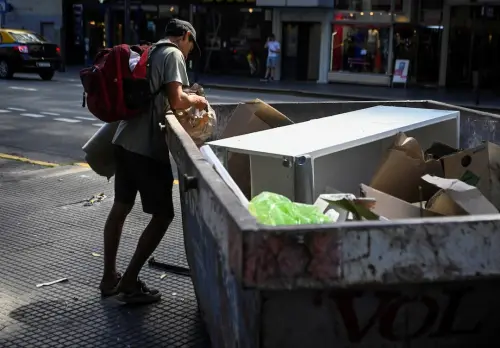Argentina's poverty rate fell significantly in the second half of 2024, according to the INDEC statistics agency, marking a turnaround for President Javier Milei. His initial austerity measures had plunged millions into hardship. The poverty rate dropped to 38.1% from an alarming 52.9% during the first half of the previous year, following Milei's assumption of office in late 2023, which included devaluing the peso and implementing drastic cuts in state spending to address a deep fiscal deficit.
This decline in poverty provides a boost for Milei ahead of the midterm elections later this year. His pro-market policies have attracted investors, but revitalizing the real economy poses a significant challenge amid rising protests over the cost of living.
The poverty rate, aided by a decrease in inflation from nearly 300% to under 70%, is now below the 41.7% recorded at the end of the previous center-left Peronist government, which Milei defeated in a surprising electoral victory.
The government stated that "the path of economic freedom and fiscal responsibility is the way to reduce poverty in the long term," following the release of poverty statistics. Despite the positive figures, INDEC reported that approximately 11.3 million people remain in poverty, with 2.5 million living in severe poverty.
Many Argentines, however, continue to feel the effects of economic hardship. Some have resorted to scouring for discarded food or taking low-paying informal jobs. Jorge Silvero, a Buenos Aires resident, noted the increase in people rummaging through dumpsters for sustenance.
"People are coming to look and take home a small bag of bagallo, some vegetables," he said. "They have enough to eat, at least to take home. But there is a terrible hunger."
There is a glimmer of hope that the worst may be behind. "Now we have price stability, or at least macroeconomic stability and much lower inflation," said Agustin Salvia, director of the Argentina Social Debt Observatory at the Catholic University of Argentina. However, he cautioned that income levels for workers, retirees, and pensioners remain below their late 2023 levels, with many resorting to more precarious, subsistence jobs and informal work.
Jose Rolando Ailan, searching for discarded fruits and vegetables outside a market in Tapiales, observed that more people are scavenging for food than ever before. "I've never seen people coming here to scavenge like they are now," he remarked. "It makes me feel sad to see men and women coming here with their children just to scrape by."
